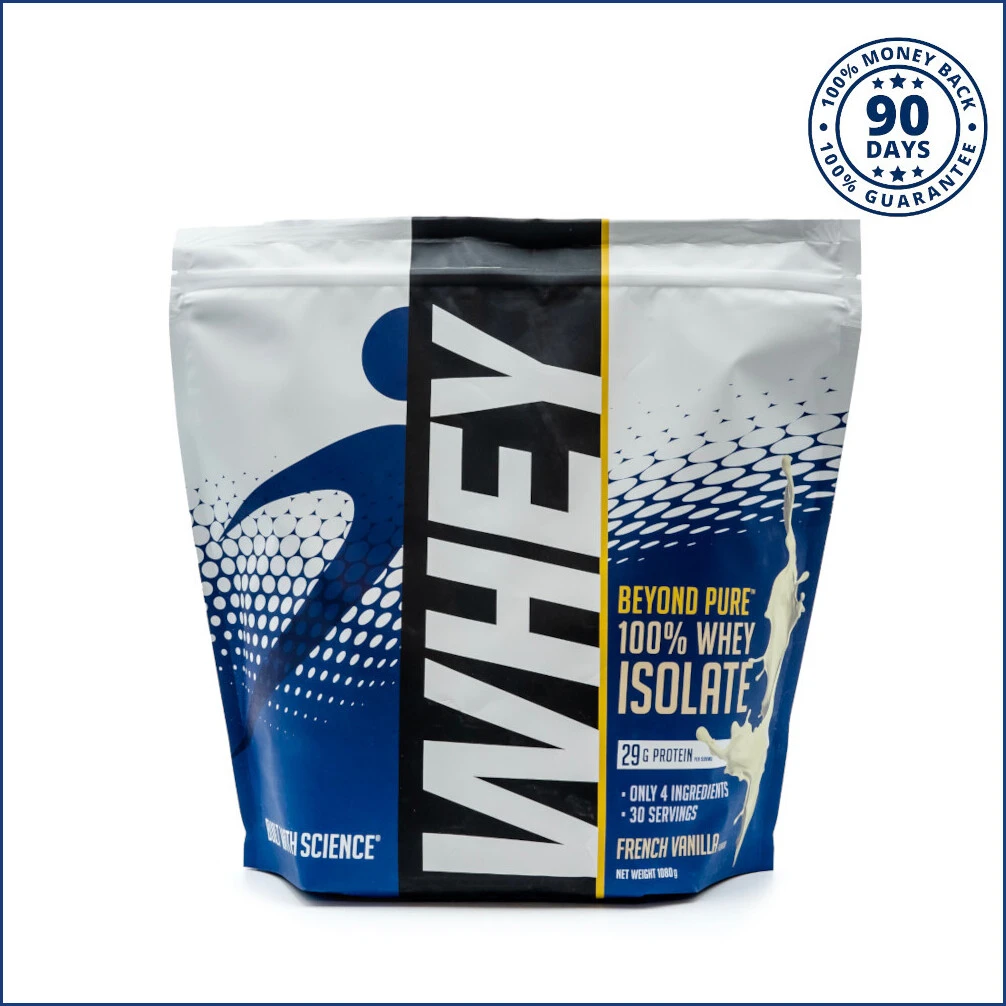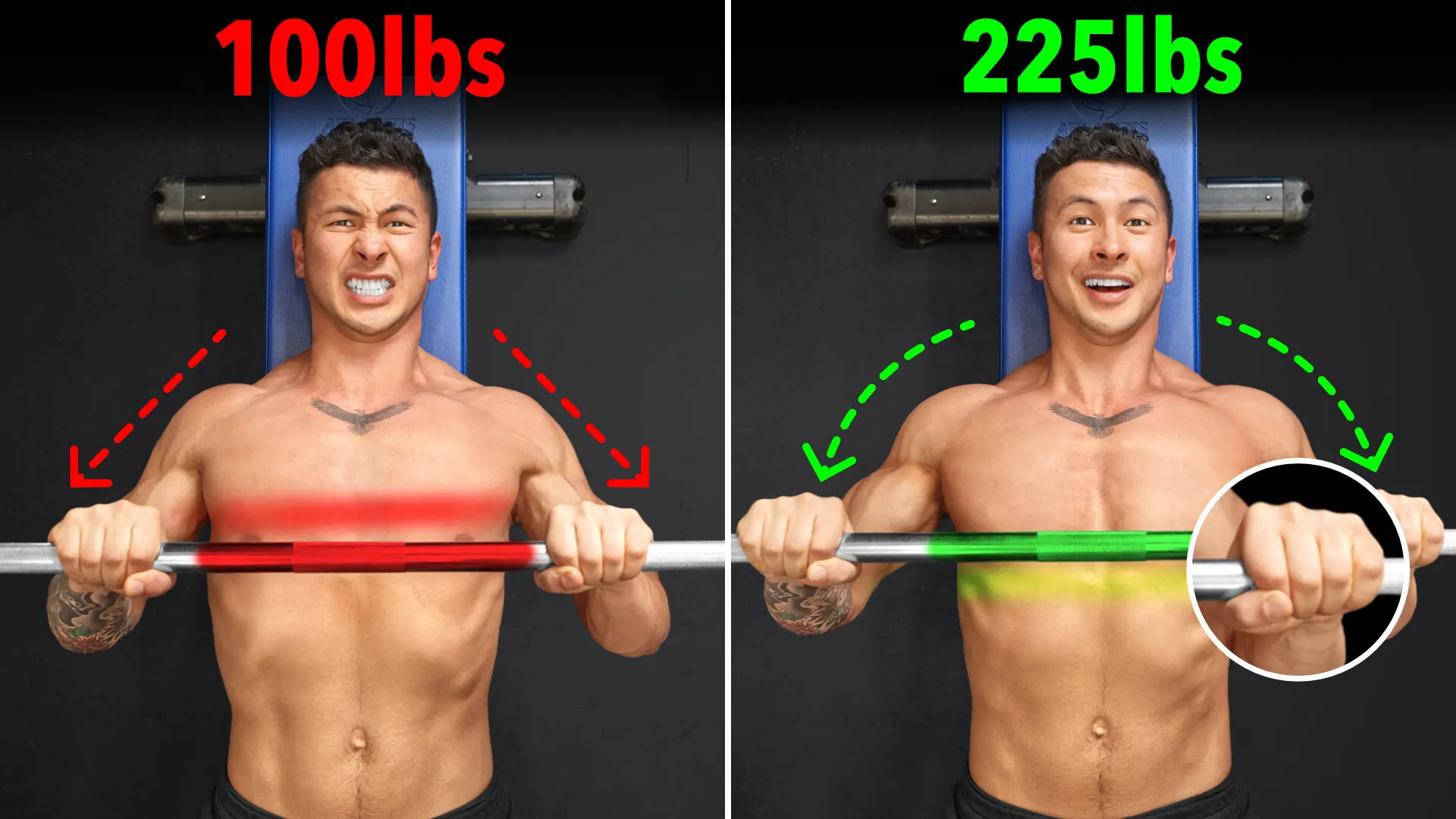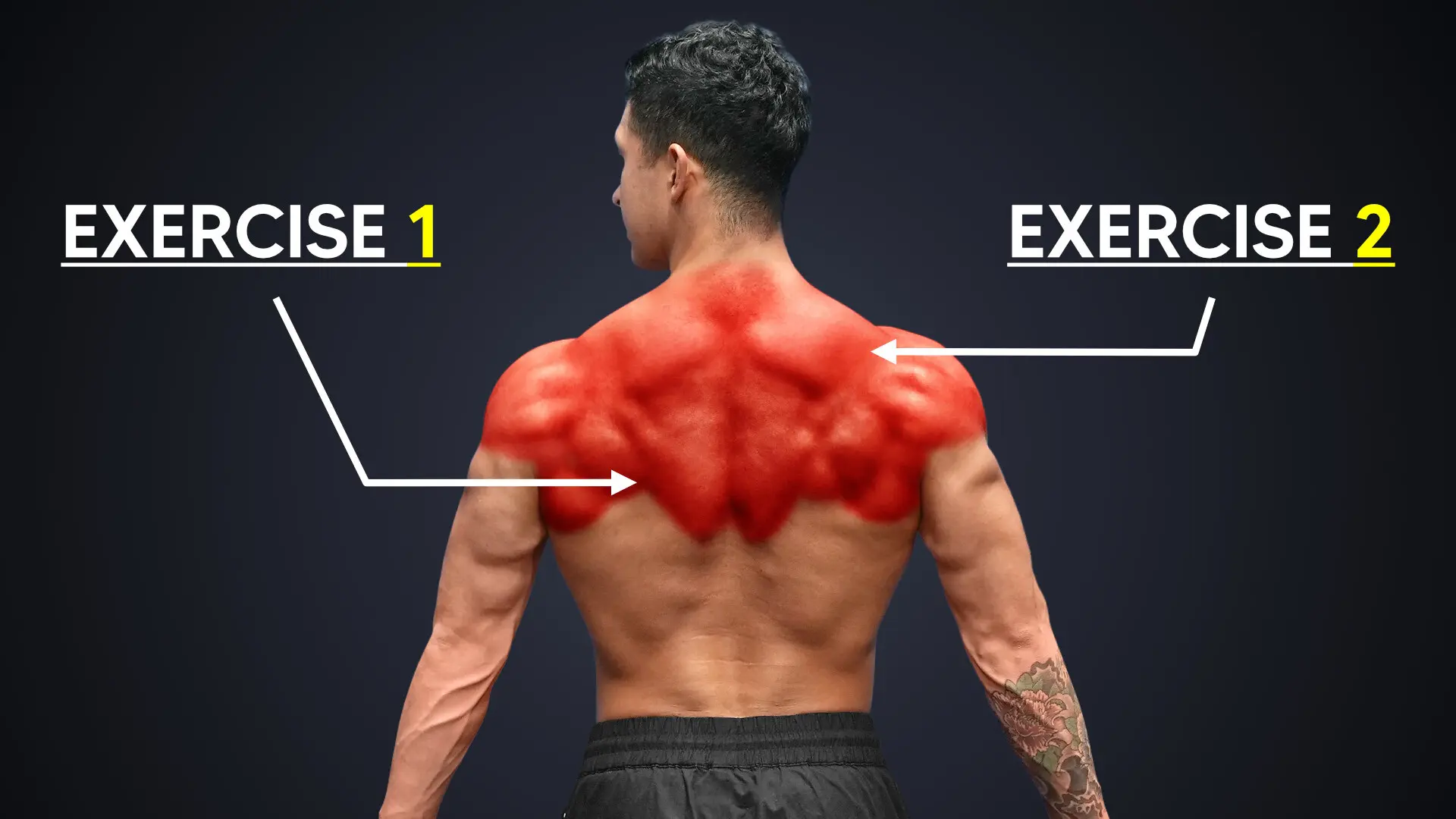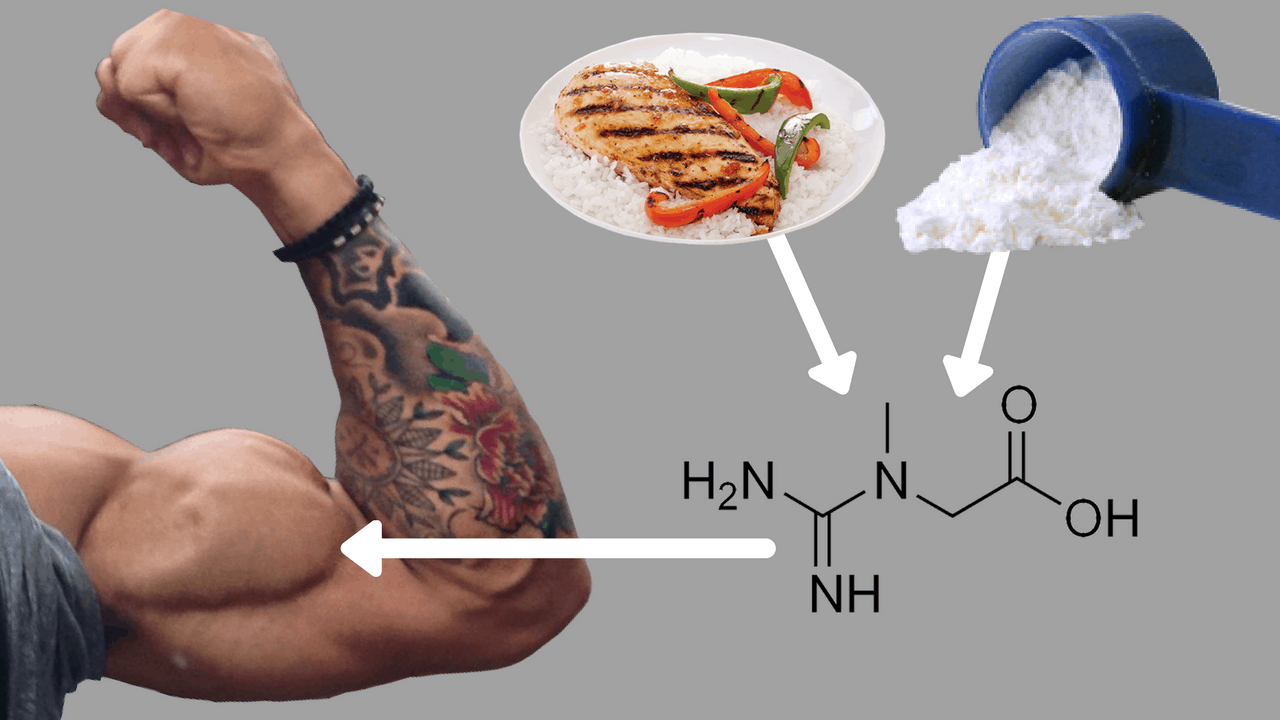
How to Take Creatine for Muscle Growth (12 Studies)
If you want to know how to take creatine most effectively for muscle growth, then you need to read this article.
Out of all the supplements out there, creatine is one of the few that's actually been consistently well-backed by research.
Several studies have proven creatine's benefits in helping slightly improve the rate of strength and thus muscle gains while also improving other factors like anaerobic capacity and power output.
Therefore, there’s no question that it can be slightly beneficial for strength and muscle gains in those that respond to it.
But what’s less well known is how to take creatine to maximize its effectiveness and whether there are any potential side effects. In fact, you can significantly increase creatine's effectiveness (i.e., get the best bang for your buck) by simply learning how to properly use creatine.
So in this article, we’ll cover exactly how to take creatine — and go over whether creatine supplementation has any side effects.
Before learning how to take creatine: if you're looking for a training program that'll always help you train in the most effective, optimal approach for muscle growth, I've got just the thing for you. Every BWS program is designed to help you transform your physique in the most time-efficient manner. And best of all? It's all rooted in science. For more information on how BWS programs can help you to look better - FAST:
Click the button below to take my analysis quiz to discover the best program for you:
↓
What Is Creatine And What Are Its Benefits?
Creatine is a molecule that is naturally found in the body.
Some individuals have naturally higher levels than others do. It's also found in a variety of food sources, such as steak, fish, and eggs.
Although creatine is naturally found in the body and in various protein sources, we can increase our creatine content by supplementing with it. But why would we do this?
Well, simply put, when we lift weights we use ATP, which is the main energy source for our muscles. As we lift, we deplete these ATP stores to the point where we fatigue. This is part of what prevents us from performing more reps after we reach a point of exhaustion.
This is where creatine comes in. It improves strength gains by enabling a faster regeneration of ATP.

This ultimately allows us to perform that extra rep or two when we’re lifting weights.
This may not sound like a lot, but in the long run, this can lead to slightly better strength and muscle gains which is important for us natural lifters!
Creatine Responders vs Non-Responders
It’s also important to know that the literature has found that there are responders and non-responders to creatine. Some people respond well to creatine, whereas others don’t respond at all.
Research seems to suggest that responders typically have a high percentage of type 2 muscle fibers and a low initial creatine content. Conversely, non-responders typically have a low percentage of type 2 muscle fibers and a high initial muscle creatine content.
Non-Responders Vs. Responders
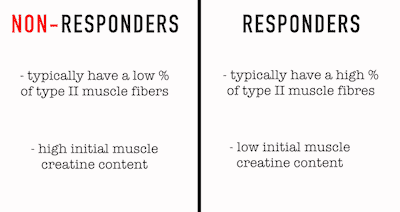
This implies that there is an upper limit with regards to creatine and its effects since further increasing creatine content was not beneficial for non-responders.
As for whether to tell if you’re a non-responder or not, in a non-clinical setting, it’s pretty difficult to do. But if you are a responder, studies show that your weight should increase more than usual after a month or so of supplementation due to the water retention effects of creatine in the muscles.
So I would suggest trying it out and monitoring how your strength and weight change over the next few months.
Subjectively assess if this increase is greater than usual.
Now that we understand how and why creatine works, let’s take a look at how to take creatine in order to maximize its effectiveness.
How To Use Creatine
What Type Of Creatine Should You Get?
Despite all the marketing gimmicks out there claiming that different forms of creatine are more effective, research has concluded that this simply isn’t the case.
As stated by Kreider and colleagues:
"Claims that different forms of creatine are degraded to a lesser degree than creatine monohydrate in vivo or result in a greater uptake to muscle are currently unfounded."
This simply means that creatine monohydrate is the most effective (and the cheapest as well, might I add) form out there despite what supplement companies or Popeye's salesmen might tell you. And this recent 2021 systematic review agrees.
Long story short, save your money and stick to creatine monohydrate.
How To Take Creatine (Loading, Cycling)
When it comes to how to take creatine, there are 3 protocols you could try:
- You can load creatine by first taking around 20g per day for 5-7 days. And then you ingest 3-5 grams a day after that to maintain the elevated creatine stores.
- You can take 3-5 grams of creatine every day right from the start.
- You can cycle on and off creatine for a few weeks at a time.
Research shows that both of the above protocols 1 and 2 provide the same effect in terms of raising muscle creatine content.
However, the loading protocol does it faster.
Therefore, a loading phase might be best since it provides faster ergogenic effects. But it's really up to you.
The third option doesn’t appear to be superior to the other methods.
Nor is it necessary since research shows that your natural creatine stores don’t seem to decrease or compensate in any way with long-term supplementation of creatine.
Thus, don't waste your time cycling!
What Should You Take It With?
This is where it gets interesting.
Taking creatine with carbohydrate or carbohydrate and protein increases the amount of creatine retained in the muscle, but this is probably only useful during the loading phase for a quicker saturation of your stores (in 2 to 4 days instead of 5 to 7).
When Should You Take It?
When it comes to how to take creatine, timing doesn’t really matter. Just take it when it is most convenient for you.
That said, if timing mattered at all, it would likely be during the initial saturation phase, as it's possible taking it after a workout would have a benefit in quicker saturation of stores.
However, it is unlikely to matter on an ongoing basis, and the small benefits you would get from slightly increasing the speed of saturation likely aren’t much.
Knowing when to take your supplements (in addition to creatine) to best optimize muscle growth is pretty complicated. Thankfully, though, the team here at BWS has the necessary expertise to do just that. Our 3-on-1 coaching program takes the guesswork out of training, nutrition, supplementation, and even mobility work - so you can focus on what matters: making gains. If you're interested::
Click the button below to find out more about the 3-on-1 coaching program:
↓
Creatine Side Effects
OK, now that you know how to take creatine, let’s talk about potential side effects.
With all the benefits of creatine, there must be a catch, right? Since creatine became a popular supplement in the 1990s, there’s been over 1,000 studies.
In all of these studies, including studies where subjects of all ages took high doses of creatine daily for up to 5 years, the only consistently reported side effect from creatine supplementation has been weight gain due to water retention in the muscles.
This was true in subjects of all ages — ranging from infants to the elderly.
However, researchers have noted that in some individuals, stomach cramping can occur when creatine is supplemented without sufficient water.
They also noted that diarrhea can occur when too much creatine is taken at once.
Although these cases were rare, I’d still suggest ensuring you are staying hydrated and that you space out your creatine intake throughout the day (especially during the loading phase) if you experience any stomach discomfort.
Creatine And Hair Loss?
Be honest. Would you still be interested in learning how to take creatine if it made you lose your hair? Probably not.
So, the big question here is: does creatine cause hair loss? Or not?
This whole idea came about from one 2009 study that showed creatine supplementation increased the levels of the hormone DHT in male rugby players.
Since DHT can accelerate hair loss in those with a history of male pattern baldness, it’s hypothesized that creatine may accelerate baldness in those who are susceptible.
But this whole idea is based on just this one study which is yet to be replicated or even shown to have an effect on male pattern baldness at all.
So, in my opinion, those without a history of male pattern baldness don’t need to worry about this at all. Whereas those who do, it’s something you might want to consider, but again, the evidence really is inconclusive at the moment.
All in all, creatine has been proven time and time again to be an effective and safe supplement for those of all ages. However, I'd suggest checking with your doctor if you're concerned about any potential side effects.
Summary
So to sum the article up, here are the key takeaways:
- Creatine monohydrate is the most effective (and cheapest) form of creatine, so stick with that.
- Take it with adequate protein and carbs and ideally post-workout.
- A loading phase will help it act faster, otherwise, just take 3-5g per day every day. Cycling is not needed.
- There are no known adverse health effects of long-term creatine supplementation. There's some evidence that it may affect those with male pattern baldness. But findings are inconclusive as of now.
Congrats! You now know how to take creatine most effectively for muscle growth.
However, one thing I want you to keep in mind is that supplements are only one very small piece of the puzzle. Your science-based diet and training should always be your focus. And as a beginner, you shouldn't even be worrying about supplements at this stage.
Understand and optimize your nutrition and training, and then worry about supplements further down the road.
Anyways, I hope this article helps you guys out and clears up a lot of the BS you've probably heard regarding creatine. Save your money and get the best results by following the advice in this article.
And for those looking for a complete step-by-step program that uses science to show you how to properly train AND eat week after week to transform your body in the most efficient and injury-free way possible, then:
Click the button below to take my analysis quiz to discover the best program for you:
↓
By the way, here’s the article summed up into a YouTube video:
Thanks for sticking till the end, and don't forget to give me a follow and connect with me on Instagram, Facebook, and Youtube as well. Cheers!

